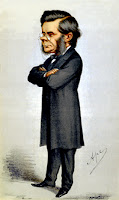Alice Gaines
As a social scientist by training, I’ve always been a great admirer of Charles Darwin and his elegant theory of evolution, which now serves as the bedrock of modern biology. I’ve even made reference to Darwin in some of my books set in the Victorian period. I had one heroine who wanted to follow the great naturalist’s itinerary around South America, and I had another who’d actually met Darwin. (I even included two super-computers named Darwin and Huxley in an unpublished contemporary romance.)
On the Origin of Species by Means of Natural Selection, or the Preservation of Favoured Races in the Struggle for Life appeared on November 24, 1859. It’s entire first print run sold out in a day, and it was republished in January of 1860. It went through six editions in Darwin’s lifetime, ending with the shorter title, The Origin of the Species. It has been continually in print ever since.
Rather different from the way we view science today, the discipline wasn’t considered the exclusive province of people with years of university education and lots of letters after their names but was accessible to the educated public. The Origin itself was aimed at a general audience, much in the same vein as popular works by Carl Sagan and Stephen Jay Gould. Non-academics, like Darwin himself, did field work and became experts in the natural sciences. Clergy made a serious study of nature under the commonly held assumption of the day that the best way to understand the Creator was to learn about His creations.
Whereas science and religion usually collaborated, the most controversial assertion of Darwin’s theory -- that humans had evolved in the same way other animals had and that we shared a common ancestor with the great apes -- offended people who felt “man” had been created in the image of God, in other words, just about everyone except for hardcore Darwinists. The issue came to a head at a meeting of the British Association for the Advancement of Science in June of 1860. A vigorous debate broke out after the presentation of a paper “On the intellectual development of Europe” by an American MD named Draper. Among the many comments and barbs exchanged, the most famous occurred between Thomas Huxley, self-described as “Darwin’s bulldog,” and The Bishop of Oxford Samuel (Soapy Sam) Wilberforce. It would become legendary in the history of science as the day Darwinian theory triumphed over theology.
The most dramatic account appeared in an article by Mrs. Isabella Sidgwick in Macmillan’s Magazine in 1898 titled “A Grandmother’s Tales.” Grandmother included the following in her description of what went on that day:
Then the Bishop rose, and,…turning to his antagonist with a smiling insolence, he begged to know, was it through his grandfather or his grandmother that he claimed his descent from a monkey? On this Mr Huxley slowly and deliberately arose…and spoke those tremendous words - words which no one seems sure of now, nor I think, could remember just after they were spoken, for their meaning took away our breath, though it left us in no doubt as to what it was. He was not ashamed to have a monkey for his ancestor; but he would be ashamed to be connected with a man who used great gifts to obscure the truth. No one doubted his meaning and the effect was tremendous. One lady fainted and had to (sic) carried out: I, for one, jumped out of my seat; and when in the evening we met at Dr Caubeney's, every one was eager to congratulate the hero of the day.
Not exactly the way scientific papers are normally presented today.
It turns out that there are many different accounts of what happened during that exchange, none of the others quite that dramatic. In fact, this description was published almost thirty years after the event. One author suggest that Huxley actually said that he’d rather be descended from an ape than a bishop. Another claims that Huxley put the hypothetical question of his parentage to himself to make his point. There were 700 people in the room and no microphones, and things may well have gotten rather rowdy.
Even if the incident has grown in drama over the years, these days an exciting new theory wouldn’t be discussed by a “bulldog” without advanced degrees and a bishop. I don’t mean that as a slap against religion. Wilberforce had written a insightful 19,000 word critical review of The Origin for The Quarterly Review in which he’d argued that, if the data supported the theory, he’d be forced to accept the conclusions. He found the data unconvincing, mostly because of the paucity of intermediate forms in the fossil record.
We might all be a better educated society with more Carl Sagans and Stephen Jay Goulds and more debates like the one between Huxley and Wilberforce.
Alice's Website
authoralicegaines@yahoo.com




1 comment:
Love the grandmother's tale!
Post a Comment